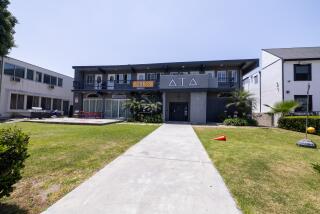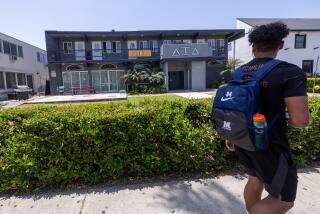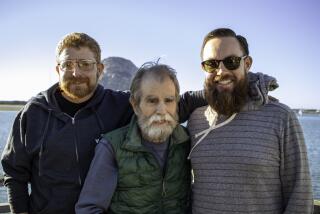Random violence takes a man who saved lives
- Share via
The day he died, Christopher O’Leary, 34, awoke as usual, prepared to save lives.
It is difficult to find meaning in death, particularly when the victim is young and responsible, as O’Leary was, cut down in the middle of the day at the height of a selfless career. Since his death, O’Leary’s loved ones and colleagues have been retracing his final hours, compelled to look for an explanation, a pattern.
Even Thursday, after police announced the arrest of a 17-year-old in connection with the killing, little seems to add up. Los Angeles Police Det. P.J. Morris said police were still investigating what appears to have been a random killing.
The youth, whose name was not released because of his age, had moved to Highland Park from Henderson, Nev., a week ago and did not know O’Leary.
It was O’Leary’s job to track and help prevent the spread of sexually transmitted diseases among some of the area’s most at-risk people, including Spanish-speaking immigrants, low-income black women and gay men.
O’Leary was a rising star in his field and an idol to his younger sister and brother. The Sacramento native had won a full scholarship to UCLA, where he graduated summa cum laude, and another full scholarship to the University of Michigan, where he earned a doctorate in anthropology.
The day he died, Jan. 20, O’Leary rose at his northeast L.A. home about 9 a.m. full of nervous energy. A behavioral scientist with the Los Angeles County Department of Public Health, he had been scheduled to leave the next day for a conference at UC San Francisco. He would have been a featured speaker. A lean 6 feet tall with blond hair and bright green eyes, O’Leary was a runner who exercised daily. So to relax that morning, he put on some Bobby Darin swing music and grabbed his wife, Michele Rose O’Leary, to dance.
O’Leary met Michele Rose, 35, a petite brunet psychotherapist, during graduate school. She compared herself to former “American Idol” winner Kelly Clarkson -- very girl-next-door. But O’Leary saw her as a glamour girl, his own Charlize Theron.
As Darin crooned, O’Leary spun his wife across the floor:
And if this band don’t desert me,
then there’s nothing
in the world can hurt me,
long as I’m singing my song.
Afterward, he was happy yet still nervous. So he went to the market for ingredients and cooked his “gnarly breakfast”: fried eggs, seasoned potatoes and a Bloody Mary on the side.
But he was still on edge. Around noon, O’Leary asked his wife for cash to indulge in another guilty pleasure: a cigarette.
The couple smoked only occasionally, never in the house, which they bought three months ago and shared with their dogs Flor, a terrier mix, and Spike, a Chihuahua.
Michele grinned at her husband, noticing as she prepared to leave for the gym that he was still wearing her University of Michigan sweat shirt. On her way out, she handed him $5.50.
Some time after noon, O’Leary left the house, not bothering to take his wallet or wedding band, waved to a neighbor and shouted in Spanish -- one of four languages he spoke -- that he was “going to be bad.”
He bought some cigarettes and walked to a building on Lincoln Avenue, a place where neighborhood kids wouldn’t see him setting a bad example by lighting up.
Meanwhile, his wife, halfway to the Glendale gym, changed her mind and headed home. As she crossed Lincoln, she noticed a parked ambulance and thought she saw paramedics treating a homeless man who had collapsed. Then she saw her University of Michigan sweat shirt.
It looked, she said, as if her husband were having a seizure.
O’Leary had been shot in the upper body. Witnesses had called to report the shooting about 12:55 p.m., but the only description of the suspect was a man wearing a gray sweat shirt.
O’Leary was unable to speak.
Paramedics rushed him to Huntington Hospital in Pasadena. By about 9 p.m., he was brain dead.
Shortly after that, O’Leary’s parents, who had planned to meet him in San Francisco for lunch, arrived at his bedside.
On Saturday, friends plan to gather at 1 p.m. around an altar built in O’Leary’s memory at Hollywood Forever Cemetery, where he often celebrated the Day of the Dead.
Nothing was taken, so the attack does not appear to have been a robbery, said Los Angeles Police Det. Larry Burcher.
He said there are no signs O’Leary was involved in criminal activity -- “nothing in his life that would have led to this.”
Morris said police have several pieces of evidence tying the teenager to the shooting but declined to provide specifics or say whether they recovered a gun.
He was arrested about 2 p.m. Wednesday and is being held at Eastlake Juvenile Justice Center. He had not yet registered for school, Morris said, and had no local criminal record.
“It’s one of the very rare acts of random violence that I’ve come across,” said Burcher, a 17-year LAPD veteran.
O’Leary’s supervisor, Jorge Montoya, misses the world traveler who used to brew their morning mate tea, who “debated everything from whether Blondie was punk or rock to the appropriate way to do qualitative research.”
Montoya reviewed the events that preceded O’Leary’s death, but no analysis could make sense of it.
Neither can family friend Richard Kovacik.
“This couldn’t make less sense as far as when it happened, where it happened, to whom it happened,” he said.
“How could this have happened to him?” another friend e-mailed O’Leary’s family. “Why do things like this happen at all?” It’s an eternal question. What is known in Christopher O’Leary’s case is that at the hospital Jan. 20, even after his family had said their goodbyes and he had been pronounced dead, O’Leary continued to give to others.
He was an organ donor. Doctors estimate that his gift will help nine to 20 people.
--
molly.hennessy-[email protected]
More to Read
Sign up for Essential California
The most important California stories and recommendations in your inbox every morning.
You may occasionally receive promotional content from the Los Angeles Times.











